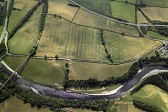A NEW book just published reveals the true extent of the Roman Empire’s attempts to conquer Scotland – and explores the archaeological legacy left behind.
Roman Camps in Scotland brings together a full archaeological record of the Empire’s military outposts, which were designed to be the temporary homes and headquarters for conquering legions and armies.
The camps are the least-studied form of Roman monument, but are among the largest features to survive in the landscape to the present day.
Scotland is home to the largest number of surviving Roman camps in Europe – with a particular concentration in the Borders and the south of the country – indicating that the attempts to conquer and occupy Scotland were much more extensive than previously thought.
Author, Dr Rebecca Jones, an RCAHMS archaeologist and expert on the Roman frontiers, highlights the sheer number of Roman camps throughout Scotland and the rest of the UK: up to 260 have now been discovered and recorded in Scotland, adding to some 240 in England and Wales.
The camps provided accommodation for hundreds – and sometimes thousands – of soldiers at the most basic level. Although they were only occupied for very short periods of time, they have left distinctive imprints in the landscape that can still be detected today.
Many camps are discovered through aerial survey flights, particularly during dry summers, where the outlines of ancient structures lying beneath the soil show up as crop marks.
The Roman camps found in Scotland are significantly larger in scale to those discovered in England and Wales, mostly due to the size of the battle groups operating in the north of Britain and the Empire’s repeated attempts to conquer the lands beyond Hadrian’s Wall and the Antonine Wall.
A number of Roman camps – for example, Pennymuir in the Scottish Borders – have survived despite thousands of years of changes to the landscape and are still remarkably well preserved.
A camp in Kintore in Aberdeenshire, for example – which is the size of over 60 football pitches – has seen the largest excavation in the world of any camp left by the Roman Empire, yielding fascinating information about the day-to-day lives of Roman soldiers while on the march.
Over 180 Roman ovens have been recorded alongside numerous pits. The debris recovered from these pits – often rubbish thrown away by the soldiers – gives an invaluable insight into the life of an army on the move, and radiocarbon dating has confirmed that the camp was occupied in the late 1st century AD during one of the first Roman campaigns in the north east of Scotland.
RCAHMS’ aerial survey collection and existing archives of camp excavations were used extensively by Dr Jones in her research. Now every new, known, and possible camp – whether existing as earthwork remains or as crop markings seen from the air – has been mapped and recorded, alongside details of its historical significance and role in the Roman campaigns in Scotland.
The book draws on Dr Jones’ extensive knowledge of Roman archaeology and is a companion volume to earlier publications of camps in England and Wales. It is also illustrated throughout with plans, maps and photographs, and will be of interest to anyone who wishes to know more about the archaeology of the Roman army, its campaigns in northern Britain and ancient military strategy.
Dr Jones said: “For the first time we have a picture of the true extent of the Roman war machine in Scotland.
“The repeated campaigns to conquer Scotland were bloody, brutal and ultimately unsuccessful for the Roman Empire. They had to deal with tribes unwilling to be conquered and strained resources, as soldiers were always needed to fight wars elsewhere throughout their vast Empire.
“By mapping and recording the hundreds of army outposts in Scotland, we have provided an important benchmark for further research into the northernmost frontier of the Roman Empire.”
For more information or for images please contact Stuart Young, Pagoda PR, on 0131 556 0770 or email stuart.young@pagodapr.com
-Ends-
Notes for editors
- Dr Rebecca Jones is an archaeologist at the Royal Commission on the Ancient and Historical Monuments of Scotland (RCAHMS) and specialises in the Roman army and Roman frontiers. She is a graduate of the Universities of Newcastle-upon-Tyne and Glasgow. She also spent time at the University of Aberystwyth where she co-authored the volume on Roman Camps in Wales with Dr Jeff Davies.
- Roman Camps in Scotland (ISBN: 978-0903903509), published by the Society of Antiquaries of Scotland, is one of two new books by Dr Jones. The second book, Roman Camps in Britain (ISBN: 978-1848686885), provides an overview of Roman camps in Britain as a whole.
MEDIA RELEASE posted by Pagoda PR. You too can post media releases (aka press releases) on allmediascotland.com. For more information, email here.
Contact: Stuart Young
Phone: 01315560770
Email: stuart.young@pagodapr.com
Website: http://www.rcahms.gov.uk






